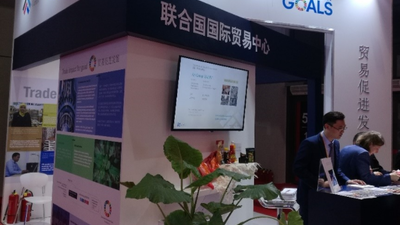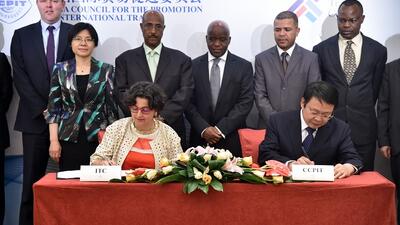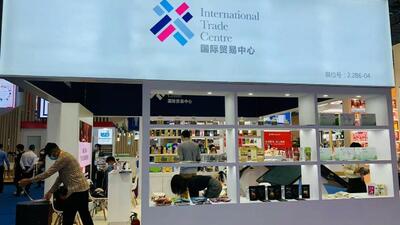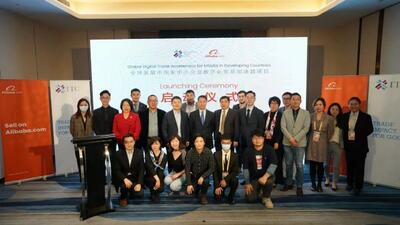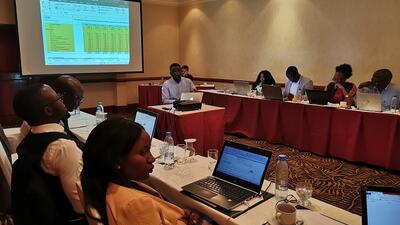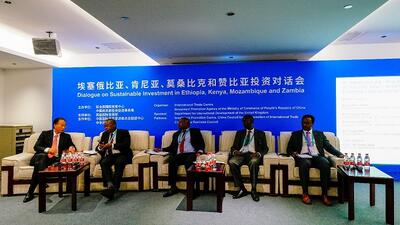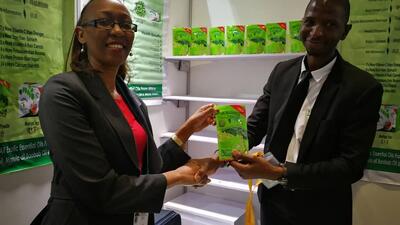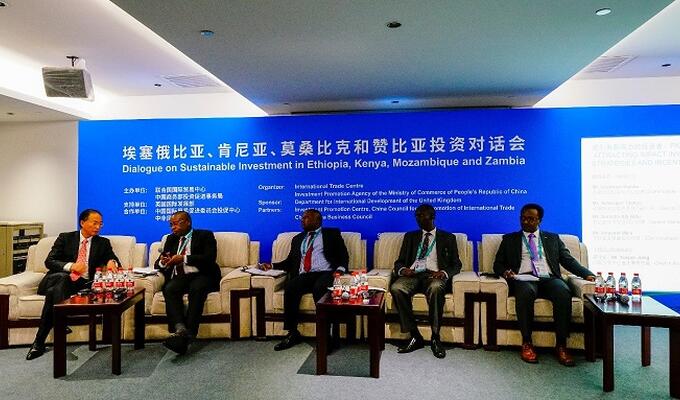
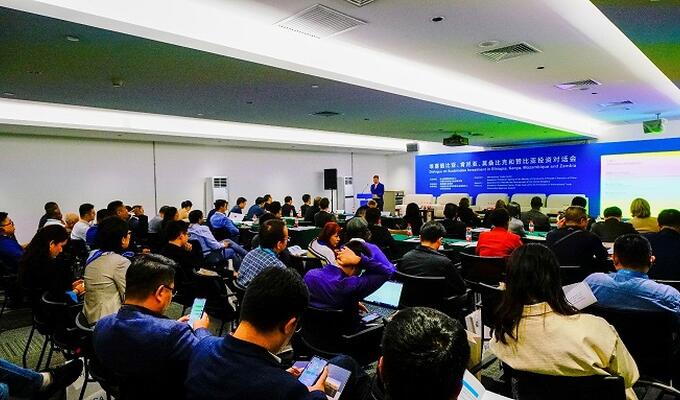
Social and environmental factors are key to successful investment in Africa, stakeholders say
It is clear that Africa is investible, but finding the balance between the business case and development factors can make all the difference
What types of sustainable investments are investment promotion agencies (IPAs) of Ethiopia, Kenya, Mozambique and Zambia looking to attract? Why consider social and environmental factors in investment decisions? Does this make business sense?
These were among the questions addressed during a meeting on sustainable investment in Ethiopia, Kenya, Mozambique and Zambia organized on 6 November 2019 by the International Trade Centre (ITC), under the Partnership for Investment and Growth in Africa (PIGA) project in collaboration with the Investment Promotion Agency of the Ministry of Commerce of the People’s Republic of China.
The dialogue gathered investment promotion agencies’ representatives from the four countries where PIGA is active – Ethiopia, Kenya, Mozambique and Zambia – and Chinese investors operating in them, as well as sustainability experts and business representatives.
Alignment with development priorities
The message that social and economic development aims – like reducing poverty, boosting incomes, and securing food and energy – go hand-in-hand with investment choices in Africa came through loud and clear from people at the meeting.
“Zambia has developed a national promotion strategy to help achieve Vision 2030 of becoming a middle-income country,” Mr. Innocent Melu, Investment Manager of the Zambia Development Agency, said.
“Investments must be aligned to this strategy centred on the following pillars: inclusiveness, agriculture, energy and education. The focus is on investments that help diversify the economy, add value to natural endowments and generate employment.”
He added, “It is key for investors to learn about the development priorities of the country, because there are specific incentives linked to the priority sectors of Zambia’s development strategies.”
For Mozambique, Mr. Lourenco Sambo, Director General of the Agency for the Promotion of Investment and Export (APIEX), said: “Mozambique is endowed with natural resources, but the country needs to attract investment that will not only focus on exploiting resources, but that will also contribute to value addition and support the development of other value chains. Agro-processing is an important sector to develop in Mozambique to contribute to the country’s food security and balance of trade. For now, the country is focused on commodity value chains for exports and value addition and job creation are very limited.”
A matter of survival?
This focus is also increasingly allied with environmental and sustainability concerns, other speakers said.
Mrs. Clare Pearson, International Development Director of DLA Piper, noted: “Climate change is an economic reality, not a threat; it is real and needs to be taken into account by all investors. Climate change and land and water sustainability are not mere corporate social responsibility issues, but are ‘survival of your company’ issues”.
Mr. Donald Larson, Founder and Chief Operating Officer of Sunshine Nut Co. added: “Consumers have more and more demands on traceability. Companies cannot just choose to abide by a certification and use it as a marketing tool. To be successful, sustainability needs to be incorporated in their DNA. This is what we do with Sunshine Nut and our quadruple bottom line results model. We look at financial, environmental, social and transformational factors.”
Mr. Yang Nan, Chairman of JP Textiles, which implements very advanced practices for water reuse in its operations, said: “The most difficult is not to implement the technology, but is cost management, especially in the conventional textile industry. Zero discharged water is very costly and reusing water does not help reduce the cost. This project is sustainable, because we work for brands with high sustainability standards. These brands want their value chains to be clean and are ready to pay a premium on the products they purchase to do so.”
Speaking one language
Meanwhile, speakers said that good communication and cultural understanding is crucial for any project’s success. It is even more important when different cultures have to interact with each other, as is the case with Chinese entrepreneurs investing in Africa. Investing in language classes and cultural training is one way to build a bridge between cultures.
Mr. Yang Nan, Chairman of JP Textiles, a Chinese textile company operating in Ethiopia, explained: “Due to religious beliefs and other cultural factors of Ethiopian staff, there is some cultural adjustment to do for Chinese employees for a good common understanding. We train Chinese employees on local religions and cultures so they do not offend the local people. In terms of languages, they are expected to speak the working language within half a year.”
He added: “We implemented training programmes for Ethiopian staff to learn Chinese; afterwards, we sent them on apprenticeship to China. When they came back, they participated during the local set-up of the company so they could also train Ethiopian workers. Chinese staff did not speak good English, so we provided them with English lessons. This was key to our success.”
As for the importance of cultural exchanges, Mr. Yin Yiqiao, President of Future Development Group, said: “Celebrating Chinese and local cultural festivities as well as organizing sport activities, such as football games, brings workers together. It creates trust, loyalty and a sense of comradeship. Working together is then easier.”
He added: “A good career development mechanism is required to cultivate high-end local talents. In each country we operate, we analyse the posts held by Chinese people to understand which ones could be done by local people with the aim of increasing the number of local staff in all managerial positions; this is key to our growth. Developing local human capital contributes to cost savings through lower turnover, higher motivation and salaries aligned with the local market.”
Three crucial steps
Ms. Pearson summarized the measures investors can take in three steps.
“First, you need a vision. You need to work along governmental lines and develop a clear vision of the contribution your company can have. Share this vision to build good relationships. Then, show passion. Visit the countries you want to invest in and learn about local cultures. Getting physically there to see the reality and kill misconceptions is a prerequisite. Finally, naturalize. Make sure you understand what is happening on the ground and start your project.”
Sustainability guidebooks
During the event PIGA launched several sustainable investment guidebooks developed to guide investors on how to incorporate sustainable practices into their investment journey. The guidebooks give concrete help about which social and environmental regulations investors need to comply with in each country, where to seek support and which additional sustainability measures can be implemented.
The Partnership for Investment and Growth in Africa (PIGA) is part of Manufacturing Africa, a flagship programme of the United Kingdom of Great Britain and Northern Ireland’s Department for International Development (DFID) facilitating foreign direct investment with high development impact into selected African countries.
Under Manufacturing Africa, PIGA aims to contribute to job creation and sustainable growth in Ethiopia, Kenya, Mozambique and Zambia by supporting these countries to attract foreign direct investment, specifically Chinese investment, in the agro-processing and light manufacturing sectors. PIGA is also designed to enhance the capacity of these countries for effective investment promotion.
PIGA is implemented by the International Trade Centre (ITC) in cooperation with the China Council for the Promotion of International Trade (CCPIT) and the China–Africa Development Fund (CADFund).




